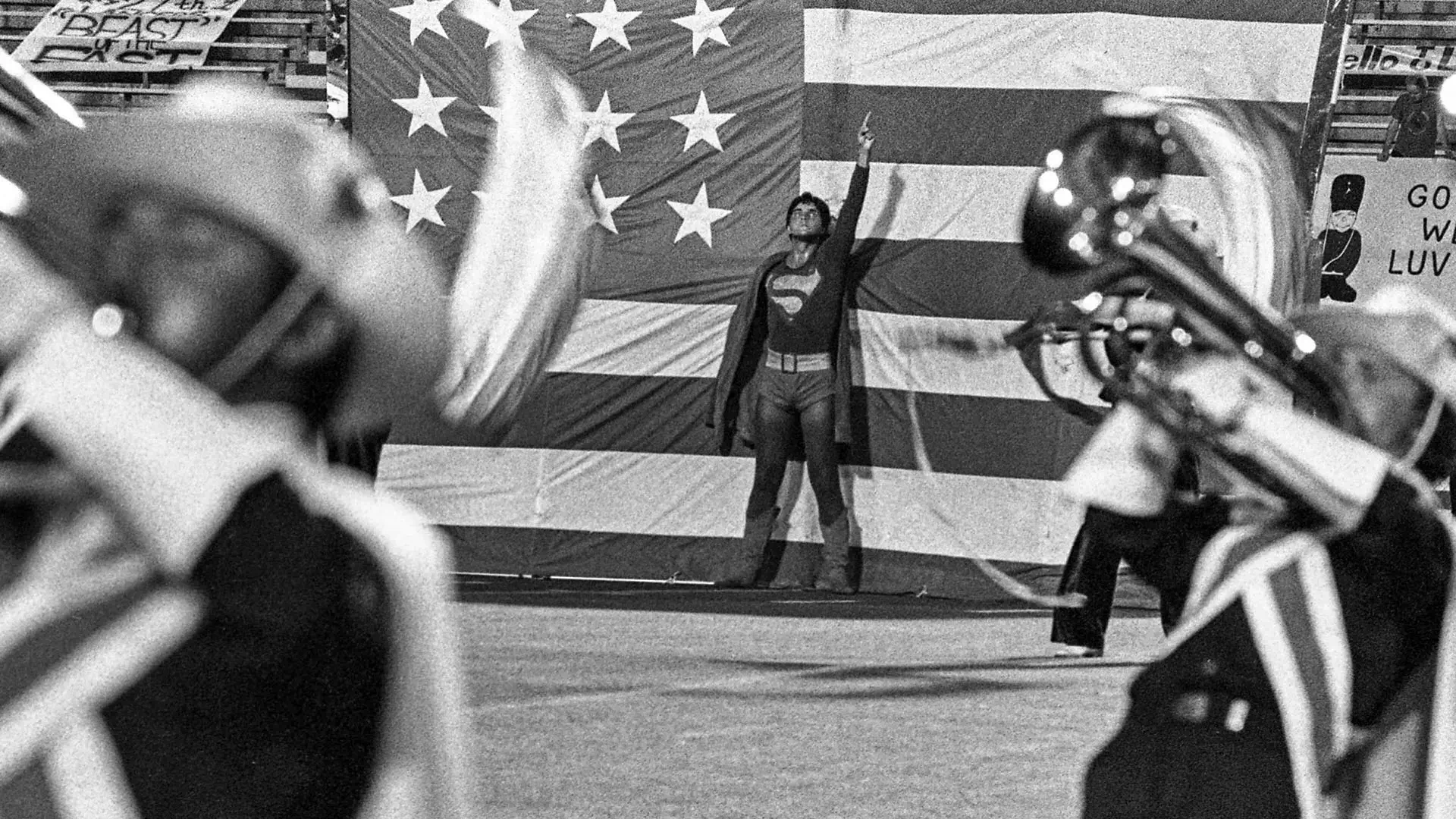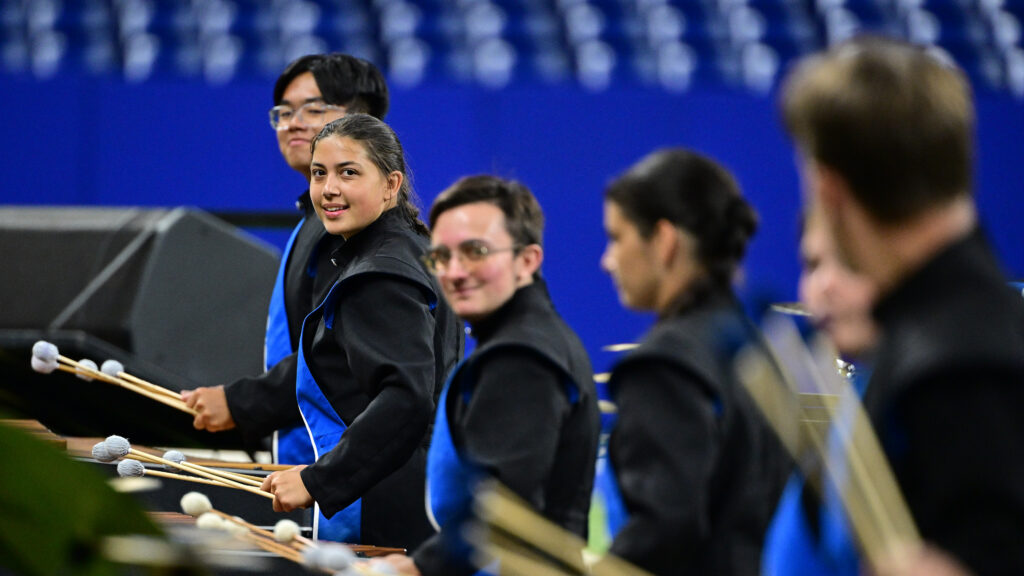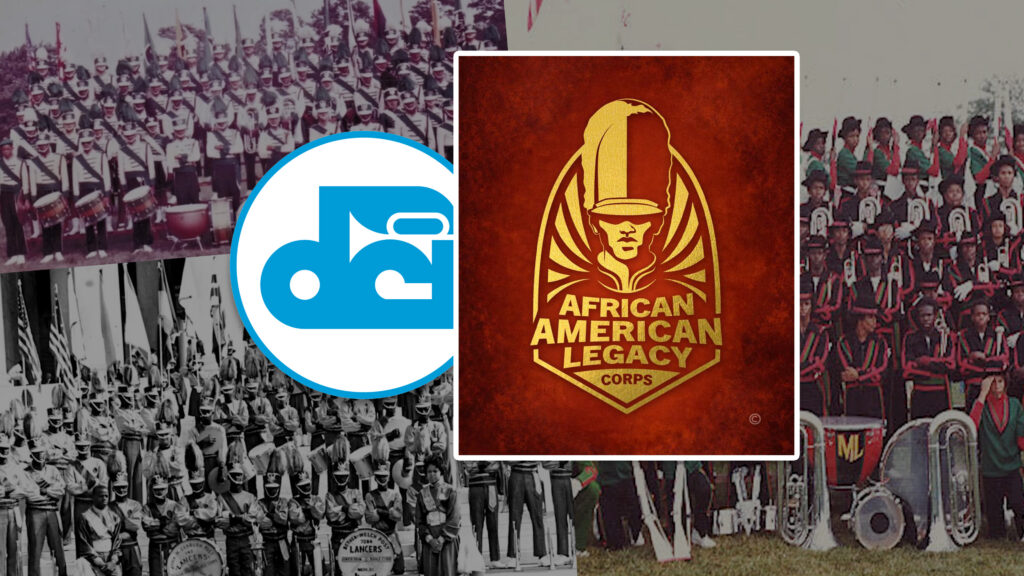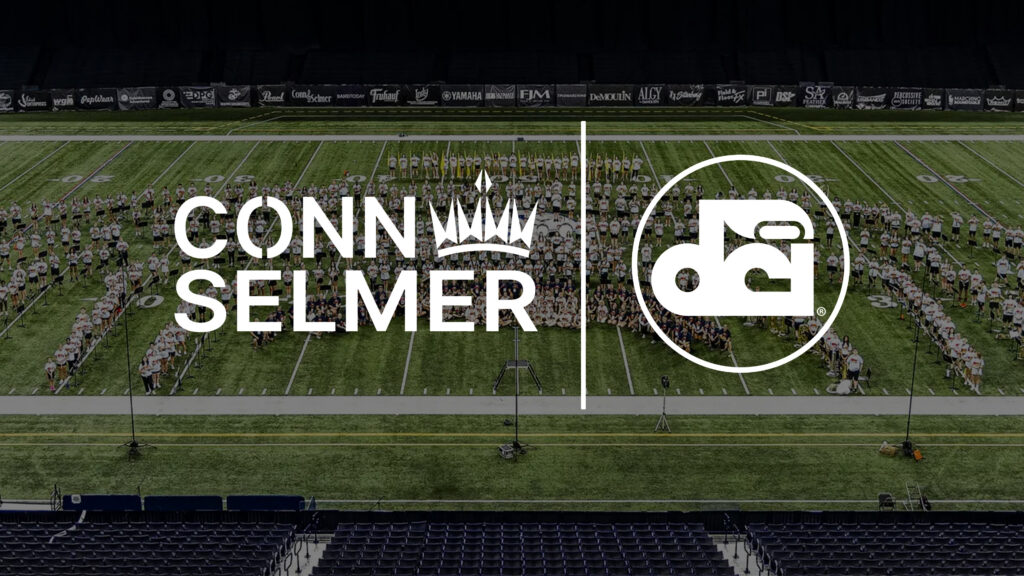In 1980, the Drum Corps International World Championships returned to Birmingham, Alabama’s Legion Field for the second year in a row.
Repeating as champions, the Blue Devils managed to hold off the surging 27th Lancers, to deny the Massachusetts corps the first Open Class (now called World Class) title to be won by an eastern corps. The Lancers had earlier in the season beaten the Blue Devils during the Prelims and Finals of the DCI Eastern Classic in Allentown.
Just two tenths of a point down from 27th Lancers and just over a half a point down from the Blue Devils were members of the Bridgemen, who thrilled the locals by warming up with the University of Alabama fight song and held a mock football game after their Finals performance, complete with Alabama cheerleaders. Spirit of Atlanta finished just under a point behind the top spot after the tragic loss during the season of brass arranger and instructor Jim Ott, while Santa Clara Vanguard slipped to seventh place, out of the top three corps for the first time in DCI’s nine-year history.

Though Crossmen had fallen out of the top-12 finalists in 1979, the corps rebounded to finish in eighth place in 1980 while roaring off the line with “Picturas de España (Pictures of Spain),” first composed by future DCI Hall of Fame member Larry Kerchner for the 1974 and 1975 Muchachos. According to Kerchner, the Muchachos had much luck in 1972 and 1973 with his previous original composition, “Espirtu del Toro (Spirit of Spain),” and he was asked by the corps to write a new work reflecting the corps’ musical growth in the mid-1970s.
In 1979, Crossmen was still in a rebuilding period after losing much of their membership following the 1978 season. The corps asked Kerchner about the possibility of doing “Picturas de España” as an opener for their 1980 season. Kerchner says the Crossmen regarded “the piece as a popular favorite with a good degree of challenge and something the members would enjoy playing. Some even saw it as a gesture of picking up the baton from the Muchachos and paying them tribute, an homage if you will. Regarding my inspiration for its creation, I simply wanted to paint an aural portrait of the soul of Spain, and drew upon my love of Spanish music to find the colors for my palette.”
The corps took the field with long capes that were white inside and red outside, shortened from the 1978 capes that practically touched the field.

Of additional note was a concert vibraphone keyboard on the front sideline that joined timpani, a set of two roto-toms, and a set of two North tenor drums, the fiberglass tenors introduced by the Blue Devils in 1976 that looked like upside-down versions of the round ventilation funnels found on large ocean-going ships. Although grounded percussion was now allowed by DCI rules, most corps still had their members march while carrying their mallet instruments, and Crossmen did this with three of their four keyboard instruments allowed by the rulebook.
John LaBarbara’s “Tiger of San Pedro” came next, which returned from the corps’ 1979 production. Originating on the 1975 album of the same name by jazz trombonist Bill Watrous and the Manhattan Wildlife Refuge big band, the title referenced one of the 56 short stories in Arthur Conan Doyle’s “The Adventures of Sherlock Holmes” collection. Early in the piece, snare drummers played their drums with their hands as the tenor drummers took a solo.
A drum solo based on Chick Corea’s “Spanish Fantasy” came off his “My Spanish Heart” album of 1976. The original was largely acoustic, despite the prominent use of synthesizers elsewhere on the album, which took up four sides on two LPs. The percussion feature ended with the brass players outlining the corps’ trademark Maltese Cross in the center of the field, surrounded by a circle of flags.

Next, the happily energetic selection of Gino Vannelli’s “Jack Miraculous” was from the singer/songwriter’s “Powerful People” album of 1974, which explored his first extensive use of synthesizers. Vannelli, who was largely introduced to audiences as the warm-up act for Stevie Wonder, was an early proponent of extensive overdubbing of several tracks, which meant his live concerts were often different from his studio recordings.
The piece ended with the color guard members appearing to fall to the ground into the splits, however, their right legs were bent and hidden behind their bodies, which made the maneuver look far more painful than it potentially was.
John Williams’ “Superman Medley” was another piece that the corps incorporated from its 1979 production. The music was from the soundtrack of “Superman: The Movie,” the 1978 smash hit film that made Christopher Reeve a Hollywood megastar.
After a quick-paced percussion intro, three round circles of brass players formed around the 50-yard line to perform three cosmic-sounding chords, first in the low brass, then the middle voices, and finally the sopranos. Those three circles, plus a circle of percussionists, moved around the field asymmetrically as if planets floating through space, each expanding and contracting to the ever-intensifying strains of “The Planet Krypton.”
As the piece built up volume, a wall was erected backfield. After the horns and drums pushed forward to the front of the field to the “Main Title March,” the wall was turned around and opened like two side-by-side doors to reveal a costumed Superman standing in front of a huge mock American flag. He pointed to the heavens at the end as if proudly proclaiming the corps was back to claim its spot among 1980’s finalist corps.
1980 Overview

Michael Boo was a member of the Cavaliers from 1975-1977. He wrote about the drum corps activity for more than 35 years while serving as a staff writer for various Drum Corps International projects. During his lifetime Boo wrote for numerous other publications including an honors-winning book on the history of figure skating. He also was an accomplished composer. Boo passed away in 2020 and was inducted into the DCI Hall of Fame posthumously in 2021.





